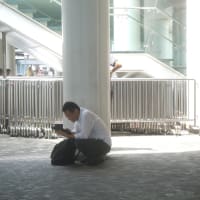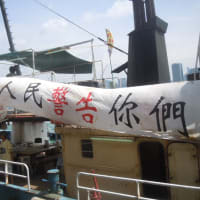上海の不動産投資額、史上初の700億元突破
(日経 2003.01.18)
http://www.nikkei.co.jp/kaigai/asia/20030117d2m1701f17.html
【上海支局】上海市で高水準の不動産投資が続いている。上海市統計局によると、昨年の投資額(完工ベース)は前年実績を14.2%上回る720億2300万元(約1兆800億円)に達した。うち私営企業や外資(香港、マカオ、台湾系を含む)による投資は37.9%増の243億5500万元だった。
完成した販売用住宅の面積は1983万9200平方メートル、実際に販売された面積は1960万6000平方メートルで、それぞれ10.7%、9.1%増加となり過去最高の規模となった。
---
危険ですなあ(ほくそ笑む) 売り逃げ組のラストスパートと
違いますかあ。深センや広州ではとっくに「価格調整」の名の
下、中央政府(朱鎔基)ジキジキに「売却阻止」圧力かけとる
というのに。
上海さん、まーだそんな事やってんですかあ。もしかして放置
してんのかな。ホントですかあ?
(日経 2003.01.18)
http://www.nikkei.co.jp/kaigai/asia/20030117d2m1701f17.html
【上海支局】上海市で高水準の不動産投資が続いている。上海市統計局によると、昨年の投資額(完工ベース)は前年実績を14.2%上回る720億2300万元(約1兆800億円)に達した。うち私営企業や外資(香港、マカオ、台湾系を含む)による投資は37.9%増の243億5500万元だった。
完成した販売用住宅の面積は1983万9200平方メートル、実際に販売された面積は1960万6000平方メートルで、それぞれ10.7%、9.1%増加となり過去最高の規模となった。
---
危険ですなあ(ほくそ笑む) 売り逃げ組のラストスパートと
違いますかあ。深センや広州ではとっくに「価格調整」の名の
下、中央政府(朱鎔基)ジキジキに「売却阻止」圧力かけとる
というのに。
上海さん、まーだそんな事やってんですかあ。もしかして放置
してんのかな。ホントですかあ?




















> 上海さん、まーだそんな事やってんですかあ。もしかして放置
> してんのかな。ホントですかあ?
上海のビルの空き室率は7割だとか。これ以上作ってどうすんの?
昼間は高層ビル群が夜間になると、明かりが灯らないとか聞いた
(気絶)
(むく)
> 上海のビルの空き室率は7割だとか。これ以上作ってどうすんの?
> 昼間は高層ビル群が夜間になると、明かりが灯らないとか聞いた
そうなんですよ。空き室率。
(また襟を正している)
久々に来ていただいたので、ちょっとコーフンして
しまいました。
>> 上海のビルの空き室率は7割だとか。これ以上作ってどうすんの?
>> 昼間は高層ビル群が夜間になると、明かりが灯らないとか聞いた
そうなんですよ。空き室率。
(何も変わってないじゃん)
不動産バブルって、要は、実体のないカネを虚構で
作り出してるだけなんだから、いつか破綻するのは
カネ好き中国人なら分からない筈がないのに。何故。
何故懲りないのか。
(でも遅くなってから中国進出しはじめた日本の
中小企業は更に不安)
(South China Morning Post 2003.01.20 Focus)
LAURENCE BRAHM
Real estate is seen as a pillar of industry driving China's economic growth, but it could be on the verge of a crisis. Evidence of a real-estate bubble can be seen in China's major cities in an unusually high ratio of empty buildings coupled with high prices and the fact that real purchasing power is limited by actual income levels.
There are three views on China's perceived real-estate bubble. The first claims the bubble has already reached a dangerous level. These economists point to inflated prices and empty properties throughout southern China, predicting metaphorically that "tall buildings will collapse" imminently.
The second view accepts that a bubble does exist but that a crisis does not. These economists more coolly note that while demand and supply are not balanced, the problem can be adjusted through government control measures.
The third view claims the bubble is caused by fervent speculation on land itself, rather than by excessive building and overextension of capital into assets, as the other two groups claim.
The overall government view is that the real-estate bubble can be capped through four measures: price controls, transaction-volume controls, financing controls and land transfers controlled through auctions as in Hong Kong [effective in March].
Indeed, the real-estate bubble may be controlled through raising the costs associated with development. But will that solve the problem, or just exacerbate it by feeding corruption?
There is plenty of open land in China. Land is not expensive, but legally owned land is. Land is under the monopoly of the state and putting it in the hands of a developer or private investor means transferring it through complicated bureaucratic procedures that require greasing at each step of the process.
In fact, many developments in Beijing are illegal, with the documentation on the buildings and land incomplete and no title deeds. Complete procedures are avoided because of the innate corruption in the bureaucracy.
Since many developers cannot afford the high costs associated with a legal transfer, most buildings do not have proper title when completed. So, many end-users buying an apartment can get the key but not the title deeds because the building itself is illegal. Without clear title, a property cannot be re-sold or mortgaged; it can only be purchased with cash. Consequently, there is no secondary market in China. People have trouble investing in real estate as an investment beyond the purpose of having a roof over their head.
In China, the market demand is for cheap housing, but developers would rather build luxury housing thanks to cheap capital from the banks and the government. The main objective of the developers is to spend their construction costs and blow the budget, since as much as 60 per cent will come back in kickbacks shared with bank officers and officials. The saying in China these days is "if you have a project you become rich".
Illustrative of this notion is the process of removing residents from land designated for redevelopment. In 1998, removals within the central business district of Chaoyang cost 5,000 yuan (HK$4,700) per square metre. Today, they cost 18,000 yuan per square metre for the developers. But people forcefully moved out of their homes are only paid 5,000 to 6,000 yuan per square metre. The balance is paid to removal companies, which are, in turn, owned by the district government. So one hand feeds the other.
Recently in the central business district some residents protested against thugs sent in by the removal companies, noting city regulations on fair and reasonable compensation. The thugs replied: "We don't care about what the law says, because we are in charge of implementing the law." In short, the removal and tearing down of old buildings is big business involving an estimated 70 per cent kickback to removal companies and, in turn, the local government officials who support the removal companies. This is why Chinese real estate is now a bubble without a market.
The central government's view is that the market has reached a peak but a soft landing is manageable. A more concerned insider view, however, is that a situation of irrational prosperity concentrated in the hands of a few now exists due to a host of distorted incentives that are driving the market. In short, real estate is not really a pillar industry in China today. But corruption is.
---
Laurence Brahm is a political economist and lawyer based in Beijing and author of China's Century and Zhu Rongji - the Transformation of Modern China.
(South China Morning Post 2003.02.04 Insight)
BILL SAVADOVE
Shanghai has given a clear signal that it will let the local property market boom as long as it contributes to economic growth and tax revenue. Statistical bureau chief Pan Jianxin said last week that no bubble exists in the market and city officials saw no reason for worry.
The debate over the state of China's property market started last year, when Premier Zhu Rongji expressed concern. The central bank then cracked down on banks offering cheap home loans.
Some cities have started collecting land appreciation tax, but not Shanghai. In fact, the city offers an income tax break for home buyers, although that policy is likely to lapse in May.
Mr Pan said demand was coming from rising incomes, foreign companies drawn to the mainland after its entry to the World Trade Organisation, and people from other provinces flocking to Shanghai. Property values have also been pushed up by Universal Studios' planned theme park, the possibility of a Disney park and the hosting of the World Expo in 2010.
But the boom has caused some residents to complain that housing is becoming unaffordable. Much of Shanghai's housing dates from before 1949, and many people are eager to move into new homes.
Even if Shanghai's property market is not a bubble, analysts say it is showing some signs of froth.
Stories abound of Taiwanese investors showing up at sales of low-cost housing in distant districts and snapping up apartments. Individual landlords are content to refuse offers and let apartments stand empty in the hope of a future bonanza. Developer Super Ocean Group is demanding a 30 per cent rise in rents from some office tenants, and refusing to negotiate.
Shanghai property prices have yet to climb back to their peaks of the 1990s. Mr Pan estimated prices on average rose 7.3 per cent last year, while residential property prices jumped 8.7 per cent.
With steady gains like that, many in Shanghai feel the time to buy is now, while the boom still has some legs.
Shanghai to abolish property restrictions
From March 1, the city will lift the limitations on sales to foreign companies
(South China Morning Post 2003.02.19 China)
BILL SAVADOVE in Shanghai
Shanghai will scrap rules that restrict the buying of property by foreign companies, officials said yesterday.
The decision, aimed at encouraging foreign investment, will take effect on March 1 and follows a similar move in the residential property market.
Until now, foreign nationals and companies have only been allowed to rent or buy office or commercial property specifically approved by the government.
Although Shanghai had effectively relaxed the restrictions on renting, the old rules remained on the books.
Su Jiguang, an official at the market management department of the Shanghai Property Bureau, said: "We announced the change to make investment go more smoothly."
He cited an increase in demand from foreign companies as another reason.
Shanghai set about lifting the restrictions on foreign companies following China's entry to the World Trade Organisation 14 months ago.
"The distinction does not match Shanghai's image as an international city," Mr Su said.
Shanghai scrapped the differentiation between so-called waixiao housing - for sale to foreigners only - and domestic housing in 2001.
At the time, the property bureau wanted to extend the policy to non-residential property, but unspecified technical problems delayed the move.
Property analysts said the latest move could increase supply and lower prices.
An analyst from the property bureau's research centre said Shanghai was banking on luring more foreign investment through the World Expo, which it is due to host in 2010.
Japan's Mori Building Company and a consortium of financial institutions announced last week that work had resumed in Shanghai on construction of what will be the world's tallest building, a huge vote of confidence for the city's property market.
But some officials have expressed concern that a property bubble is developing, especially in the housing market. Residents have complained that prices are becoming prohibitive due to speculation.
However, Shanghai Communist Party Secretary Chen Liangyu said last weekend that the city would encourage the healthy development of the market.